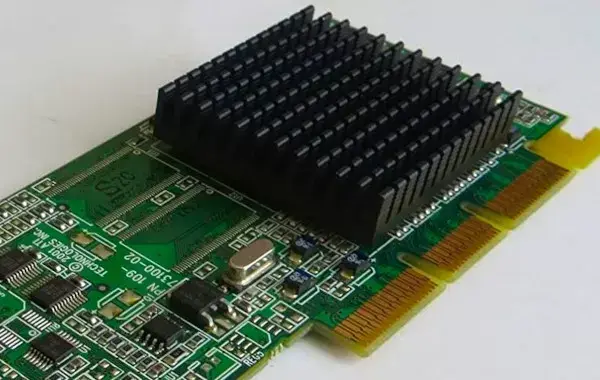Dropping support after only 25 years? I can’t believe Linux is contributing to planned obsolescence.
deleted by creator
ATI Rage 128, 3Dfx, S3 Savage, Intel 810, SiS, VIA and Matrox MGA DRM drivers
Those are some ancient cards! Can’t believe they’re supported this long.
I still have a Rage 128 hanging around as a ‘temporary head’ for installing headless servers. Many happy nights playing Thief: The Dark Project with it, and now it’s only good for rendering a TTY at a barely acceptable resolution. And soon, not even that. Goodbye, little e-waste :-(
Frame it and hang it on the wall.
Surround it with the box art of the games it powered so many years ago for extra nostalgia power
That brings me back to my first PC build, 20 years ago, using parts my friends had discarded cause they were too old.
What do you mean obsolete. I still use 'em.
Maybe you’re obsolete!
For all worrying about it I’d like to say, you can re-add driver code and compile your own kernel, and everything will be working fine, and last time I’ve read wiki there’s SLTC support for Linux 6.1 means your GPUs will be officially supported until 2033
AMD and nVidia on Windows: So your GPU is still very capable and useful for almost everything including most gaming tasks, but it’s a couple years old and not making us money any more? Sucks to be you, have fun hunting for unmaintained legacy drivers with likely security holes from questionable sources.
Linux: Your video card is from a long bygone era of computing, before the term “GPU” was a thing, and basically a museum piece by now? We’ll maintain a long-term support version for you for the next ten years.
True true)
Only 10 more years, it’s fucking ridiculous
Yeah Linux is great at supporting old hardware. I had an old desktop I built in 2009 lying around doing nothing. So I installed guix w/ a non-libre kernel onto it and brought it back to life!
Damn I’m old. I had at least two of those cards
I thought I was old, but I’ve only even heard of the 3dfx 😳
I must be ancient then. I recognized, and I think used, all of those cards/chips.
Some personally. Some at work. At work I used to maintain and MS-DOS / early Windows graphics program. I had to test the program’s compatibility with a stack of graphics cards.
I’m still angry at nvidia for buying their remains, and not doing anything useful with it.
3dfx had multi GPU support back then, it took quite a while afterwards until somebody else tried that.
I’ve had a system in the late 90s with a 3dfx voodoo card. Also had a laptop with a SIS card from the early 2000 era.
The voodoo card was THE card to have it it’s day (mine was an older second hand system though). The SIS card… for some reason they decided that standard VESA mode probing wasn’t a thing they supported and would hardware crash when that API was used. I eventually got it working in Linux after patching xfree86 to not attempt probing when loading the VESA driver.
deleted by creator
I think I remember running into that as well but for whatever reason I couldn’t get accelerated-x working with the opengl libraries I was using for school. Likely the issue was just a lack of understanding on my part as I don’t think I had a good grasp of the Linux library loader until well after I graduated.
I’ve been using (or, in some cases, trying to use) that when it was brand new. Kernel side was relatively easy - but there was a lot of compiling custom versions of XFree86 trying to get acceleration working properly.
On the one hand a bit sad to see that kind of history I’ve experienced myself go - on the other hand, it’s probably been a decade since I’ve last used something without KMS, and the ease of use of modern KMS drivers is way ahead of all the older stuff.
3DFX
There is a name I haven’t heard in a long time.
Oh no, the kernel will lose a whopping 200k SLOC!
Out of 27 million lines of code.
Which makes it 1% total. Which is a lot for one single change
SLOC?
source lines of code
This is the best summary I could come up with:
The ATI Rage 128, 3Dfx, S3 Savage, Intel 810, SiS, VIA and Matrox MGA DRM drivers were what was phased out in Linux 6.3.
Thomas Zimmermann of SUSE is now aiming to take things one step further by removing the infrastructure for user-space mode-setting.
Zimmermann wrote on dri-devel: The old drivers for user-space mode setting have been removed in Linux v6.3.
The recent Linux v6.6 has been designated as long-term release, so any remaining users have a few more years to get a new graphics card.
These 14 patches get rid of another 8k lines of legacy code within the Direct Rendering Manager subsystem.
If no objections are raised, this legacy user-space mode-setting infrastructure removal could happen for the Linux 6.8 kernel cycle in the new year.
The original article contains 340 words, the summary contains 127 words. Saved 63%. I’m a bot and I’m open source!
deleted by creator
so any remaining users have a few more years to get a new graphics card.
Anyone running a Voodoo is doing so because they want to. Dropping support is bullshit.
Volunteer to maintain the code?
Then pay someone to do the work.
Supporting obscure trash isn’t worth development time.
So just don’t upgrade the kernel
Then 0-day can become known vulnerability. Yay?
What are you doing that is so crucial to keep a 20+ year old piece of consumer hardware connected to the internet? Honest question
To answer the question as given:
https://lyonsden.net/getting-an-amiga-a1200-online-part-1-adding-a-network-card/
https://hackaday.com/2016/12/17/apple-ii-web-server-written-in-basic/
Because. The answer is because.
And if you have a machine that is more capable than those by default then the OS software artificially disabling its use is pretty fucked up.
So, there’s nothing actually crucial, it’s for tinkering. I doubt either the Apple II or the Amiga you linked are going to be secure.
Yeah you’re not actually interested in listening to what’s being said. Bye.
If you’re doing it for the memes then you don’t really need to worry about malware. Your machine is probably too old for anything that’s still floating out there to even work on it.
Many people browse 4-5 pages a day, see a few emails, print a few pdfs, and a core2duo, or x4, for 40#/$/Eu a box run flawlessly with linux and xfce/lxde for example.
Even video-conferencing works fine.Why not?
This is not about “old computers” in general, this is about a specific set of consumer graphics cards that are not needed for any of those things you mentioned.
Also worth noting: a core2duo is from around 2006. These dropped cards are from the late 90s.
Driver code is still there, you can add it back if you want, same with ide drivers and such, support was removed but code still exists, just add it and compile your own kernel, there are alot of tutorials in internet about it
Go add a 2.4 era driver to a modern kernel and see how that goes.
Then support will be until 2033 when 6.1 slts support will end
The drivers were removed in 6.3. Debian 12 is still running on 6.1. Debian 12 just came out and still has many years of support ahead of it (at least 5). You can get plenty of use out of these cards before they stop working.
But they’ll stop working due to artificial causes.
Someone needs to maintain them for them to keep working. Nobody else is willing to do that anymore, but you can still volunteer as a maintainer. If you don’t, it’s as much your fault as anyone elses.
There’s a big difference between dropping a driver and dropping the ability to have the driver. I’ve compiled plenty of drivers.
I would suppose anyone running a computer with these relics can recompile a kernel to get these drivers back
Voodoo cards are worth money to the right people. They’re used in a bunch of coin-op arcade games.
And these machines are going to upgrade to kernel 6.8?
why on earth do arcade machines need kernel updates? the feds gonna hack into the highscores lmfao
Do those arcades run Linux?
I bet you’re fun at parties.
Seems like you’re annoyed that I pointed out that what you were saying was irrelevant? And so you reply with more irrelevant crap (on a very nerdy, not-fun-at-parties internet forum for Linux discussion)? Let me know if I got that wrong.
Somebody mentioned Voodoo cards, I had a bit of information that related to that. That’s how discussions work; they kind of go where they go.
But I’ll make absolutely sure to get your permission before I comment again.
deleted by creator
I agree.
So much for the legendary hardware support of Linux!
Edit: Forgot “/s”, but look at this lively discussion!
Lol you haven’t upgraded your GPU since the late 90’s?
You know there’s a whole hobby of keeping older hardware running, right?
You’re free to use legacy kernels or run your own fork.
If only they contributed to the kernel maintenance workload.
You know that you can use older versions of the Linux kernel, right?
You know security vulnerabilities are a thing, right?
Linux 6.1 will be maintained for another 10 years by the CIP. The hardware in question will be almost 40 years old at that point. I don’t have a violin small enough for users losing free support after 40 years from maintainers who most likely don’t even own the same hardware to test on…
On the other hand, they were probably unchanged for decades. Did anything really change, or is this just a case of we need to remove 500k lines of code, what is most useless ? Let’s cut that.
In other words, removed because it’s a KPI to remove lines, and this makes number go up.
Keeping code around isn’t free. Interfaces change, regressions pop up. You have to occasionally put in work just to keep it in a working state. Usually in cases like this there are discussions on the mailing list about who is going to maintain them and nobody volunteers. You can do that if you’re so passionate about keeping these drivers around.
So if it’s been unchanged for decades then you can just add it yourself and recompile the kernel. Elsewhere you argue that you can’t just add old drivers to a newer kernel, which implies these drivers require some nontrivial amount of maintaince. Which is it.
I know what you mean, I’m so pissed that my 1978 Space Invaders arcade machine doesn’t even support WiFi-6.
Fuckin a
You know there’s nothing to gain by hacking those old systems, right?
I doubt any hardware 25+ years can even run a modern vanilla linux kernel, you’d have to compile it yourself with some serious customization for it even work


















